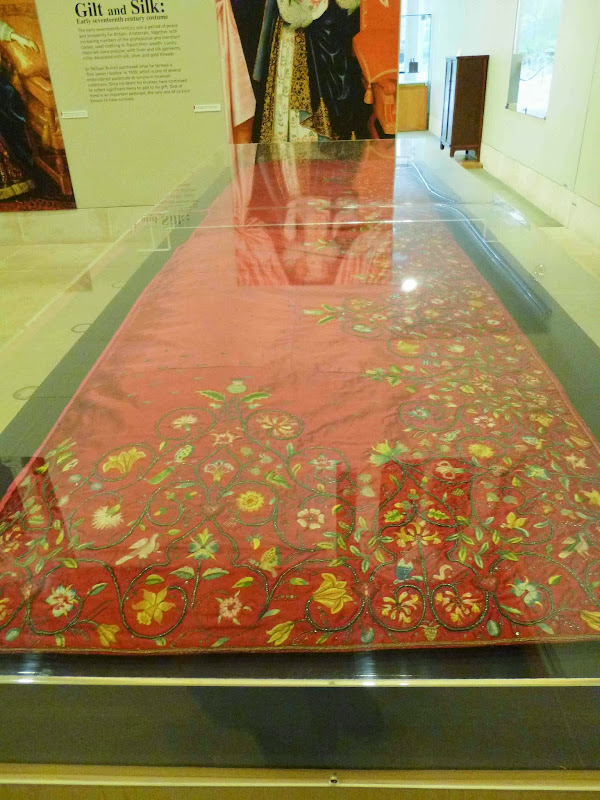Today, I'm reminiscing about the Gilt and Silk exhibit at the Burrell Collection in Glasgow, Scotland which runs through December 23, 2013.
There were so many needlework gems in the textile collection at the Burrell but having this exhibit currently running while I was visiting was icing on the cake.
I already shared two of the coifs that were on display a couple weeks ago in this post. There were also a number of sweet bags; this one being my favorite...
 |
| Sweet bag, British, 1600-1630 |
And a pair of silk and metal gloves in excellent condition...
 |
| Gloves, British, 1610-1630
Gloves were very popular in the 17th century as a way of showcasing wealth.
|
One of the largest pieces on exhibit was this ladies waistcoat with rinceau (foliage) design of scrolling vines and flowers...
 |
| Waistcoat, British, 1615-1618 |
The sweet briar rose is shown with five petals and open, symbolic of courtly love...
I like how the stripey caterpillars are intersecting the scrollwork...
This scroll design was very popular in the Medieval and Renaissance periods and is repeated on a number of other embroidered waistcoats in museum collections. You might remember a very similar pattern from this post on the Plimoth Jacket.
And here it appears again on this nightcap on exhibit...
The other large item on display at the exhibit was this embroidered satin petticoat from 1610-1620 never before seen by the public...
To me, the embroidery style seemed similar to that of Asian embroideries that I've seen...
But I have no idea if this is the case. There were many thistles embroidered on the piece...
And it is believed that it might have belonged to Anne of Denmark, wife to James VI and I.
As part of the exhibit, the museum commissioned a special film demonstrating how these garments were created and worn.
All in all, the Burrell collection had some of the finest needlework examples of 16th and 17th embroideries that I've ever seen on display at one time.
It was a garden of textile delight and I highly recommend a trip there if you ever find yourself near Glasgow. Sadly, the museum gift shop did not sell one postcard, image or book of any of their embroideries. *sniff*
However, they did allow photographs and for that, I am grateful.
Other posts regarding the textiles of the Burrell Collection:
Mirror, Mirror, on the Wall
A Tisket, A Tasket
A Tale of Two Coifs












WOW! What an awesome exhibit. I can just imagine how excited and delighted you were, Susan. So glad you got to spend some time there, soaking it all in...
ReplyDeleteI am in swoon heaven over here! Thank you so much for sharing this awesome post of your trip with us...I would love to see this in person as I imagine it was just breathtaking.
ReplyDeleteWOW! That was awesome!! I'm getting such an education reading your blog. Thank you!!! Keep it coming! :))))
ReplyDeleteWow very interesting post :)
ReplyDeleteThank you
Love x
What stunning embroidery.
ReplyDeleteI'm not sure whether any traders had reached the East by the time of James VI and I, but when they reached India it wasn't long before those styles became fashionable in Europe, so it seems very possible to me that that petticoat was stitched in a currently fashionable foreign style...
ReplyDeleteI'm not sure whether any traders had reached the East by the time of James VI and I, but when they reached India it wasn't long before those styles became fashionable in Europe, so it seems very possible to me that that petticoat was stitched in a currently fashionable foreign style...
ReplyDeleteGoodness, I had to sit down with my coffee and have a really good look at this - thank you so much for taking and posting those pictures. Whenever I see anything so incredibly fine, it increases my awe of the people who made them all that time ago. And we think we're skilled - makes you think.
ReplyDeleteWhat an indescribable
ReplyDeletesplendor!!! Absolutely wonderful! Tnahks for the tip;))) We were in Glasgow at that time on the day of the assassination, 30. Juni 2007... it was not so funny....
Love from Germany))))
I'm a little shocked that the exhibitors have labelled items from the 1600s as "British". There was no such thing as Britain until 1707. I think what they mean is that these items are English.
ReplyDeleteFabulous post...I enjoyed watching the video:)
ReplyDeleteI read your blog from some time already and the time has come to tell you how much I enjoy your posts.
ReplyDeletePersonally I'm happy that they didn't have a card for you in the shop and you had to take these breathtaking pictures :)
Very interesting! The embroidery is exquisite...I feel very rustic with my own skills. Some of the threads on the red silk piece appear shaded (not exactly variegated but in layered tones). Lovely! Thanks for sharing.
ReplyDeleteMy goodness, I wish my stitches were that neat and even. I found your blog maybe a week ago trolling hashtags on my feed reader, and was drawn in by your Scotland embroidery journal. I hope you'll share much more of it as you stitch (and maybe a sense of how you made it too).
ReplyDeleteWhat a wonderful post--I am loving this Scottish 'journey'!
ReplyDeleteI learnt something from the video: women had to keep their arms bent and hands together when wearing big gathered skirts. Thanks for putting it on your blog.
ReplyDeleteBeautiful!!
ReplyDeleteSo interesting!! Thanks for sharing !
ReplyDelete